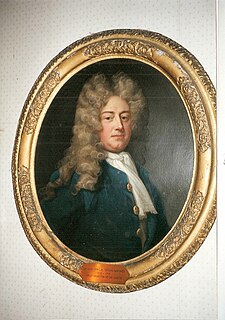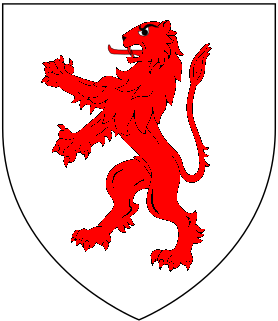
Sir John Evelyn, 1st Baronet of Wotton, Surrey, was a British official and politician who sat in the House of Commons from 1708 to 1710. His grandfather, the diarist John Evelyn, influenced his independent attitude in politics and stimulated his dedication to literature. His public offices included Postmaster-general from 1708 to 1715.
Francis Bernard SL was an Irish lawyer, politician and judge.

John Stratford, 1st Earl of Aldborough was an Irish peer and politician and member of the Noble House of Stratford.
James Dennis, 1st Baron Tracton PC was an Irish politician and judge.
This is a list of lawyers who held the rank of serjeant-at-law at the Irish Bar.
Thomas Brodrick was an Irish and British politician who sat in the Irish House of Commons between 1692 and 1727 and also in the British House of Commons from 1713 to 1727. He owned lands in both Surrey in England, and County Cork, Ireland.
Arthur Annesley, 5th Earl of Anglesey PC, PC (Ire), of Farnborough, Hampshire, Bletchingdon, Oxfordshire, and Knockgrenan, near Camolin, county Wexford, was an Anglo-Irish Tory politician who sat in the English and British House of Commons from 1702 to 1710 and in the Irish House of Commons from 1703 to 1710. He then succeeded as 6th Viscount Valentia and 5th Earl of Anglesey, joining both the upper houses. He served as Vice-Treasurer in Ireland from 1710 to 1716 and was a member of the regency commission upon the succession of George I.
The High Sheriff of Wicklow was the British Crown's judicial representative in County Wicklow, Ireland from Wicklow's formation in 1606 until 1922, when the office was abolished in the new Free State and replaced by the office of Wicklow County Sheriff. The sheriff had judicial, electoral, ceremonial and administrative functions and executed High Court Writs. In 1908, an Order in Council made the Lord-Lieutenant the Sovereign's prime representative in a county and reduced the High Sheriff's precedence. However the sheriff retained his responsibilities for the preservation of law and order in the county. The usual procedure for appointing the sheriff from 1660 onwards was that three persons were nominated at the beginning of each year from the county and the Lord Lieutenant then appointed his choice as High Sheriff for the remainder of the year. Often the other nominees were appointed as under-sheriffs. Sometimes a sheriff did not fulfil his entire term through death or other event and another sheriff was then appointed for the remainder of the year. The dates given hereunder are the dates of appointment. All addresses are in County Wicklow unless stated otherwise.

Sir William Whitelock KC was an English barrister and Tory politician. His name is also spelt Whitelocke and Whitlock.

John Rolle of Stevenstone and Bicton in Devon, was a British landowner and Tory politician who sat in the English House of Commons from 1703 to 1705 and in the British House of Commons from 1710-1730. He declined the offer of an earldom by Queen Anne, but 18 years after his death his eldest son was raised to the peerage in 1748 by King George II as Baron Rolle.
Richard Bulkeley, 4th Viscount Bulkeley, of Baron Hill, Anglesey, was a Welsh Tory politician who sat in the House of Commons between 1704 and 1724. He was extremely hot-tempered and was involved in several personal and family disputes with local Whig leaders.
Sir Thomas Pakenham (1649-1703) was an Irish barrister and politician: he sat in the Irish House of Commons as MP for Augher and held the office of Serjeant-at-law (Ireland). He was the grandfather of the first Baron Longford.
Robert Saunders (c.1650–1708) was an Irish landowner, barrister and politician. He sat in the Irish House of Commons as MP for Cavan, and was the Irish Prime Serjeant-at-law. Unusually, his youngest son, Morley Saunders, also held the office of Prime Serjeant. Robert was one of the founders of the village of Swanlinbar, County Cavan, which is partially named after him, according to Jonathan Swift, who states that "an" represents the "aund" in "Saunders".

Bartholomew Purdon was a County Cork landowner and a long-serving member of the Irish House of Commons. He was also a Justice of the Peace and served as Deputy Lord Lieutenant of County Cork for many years. He was High Sheriff of County Cork in 1708–9.
William Griffith of Cefnamwlch, Caernarvonshire, was a Welsh Tory and later Whig politician who sat in the House of Commons from 1708 to 1715.
William Neave (c.1662-1713) was an Irish barrister, politician and law officer. He held the office of Serjeant-at-law (Ireland) and in that capacity played a crucial role in the Dublin Castle administration from 1696 to 1711. He sat in the Irish House of Commons in four successive Parliaments as MP for Tulsk.
Sir William Lewen, of Ewell, Surrey, was a British merchant and Tory politician who sat in the House of Commons between 1708 and 1722. He was Lord Mayor of London in 1717.
John Pugh of Mathafarn, Llanwrin, Montgomeryshire, was a British lawyer and Tory politician who sat in the English and British House of Commons from 1705 to 1727.
Thomas Medlycott (1662–1738), of Binfield, Berkshire, and Dublin, Ireland, was a British lawyer who was an Irish attorney general and later Commissioner of Revenue and Excise for Ireland. He was first a Tory and later a Whig politician who sat in the Parliament of Ireland from 1692 to 1738, and in the English House of Commons and British House of Commons between 1705 and 1734.
John Cliffe (1661-1728) was an Irish barrister, landowner and politician. He sat in the Irish House of Commons for many years, where he was often called on to speak for the Government, and held the office of Serjeant-at-law (Ireland).




